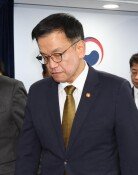Pyongyang's tactic to bash Seoul and come closer to Tokyo
Pyongyang's tactic to bash Seoul and come closer to Tokyo
Posted July. 03, 2023 07:39,
Updated July. 03, 2023 07:39
"We have not been informed of, are not aware of, and have no interest in reviewing the intention of any South Korean to visit the DPRK," North Korea said in a statement issued by a director general of its foreign ministry. Pyongyang has thus clearly expressed its objection in response to Hyundai Group Chairwoman Hyon Jeong-eun's recent bid to visit Mount Kumgang for a memorial event ahead of the 20th anniversary of the late Chairman Chung Mong-heon's death. On the other hand, North Korea has reportedly held at least two rounds of diplomatic contacts in third countries, including China and Singapore, with Japan, which has proposed high-level consultations for a North Korea-Japan summit.
North Korea's intention to secretly contact Japan while refusing to allow South Korea even for humanitarian visits is obvious. It is another version of Pyongyang’s old strategy to exclude South Korea and instead deal directly with the U.S., and a clichéd tactic to crack the recently strengthened trilateral cooperation of South Korea, the U.S., and Japan vis-a-vis North Korea. It is apparently an outcome of shared interest between Tokyo, which seeks to make progress on the Japanese abductees issue, and Pyongyang, which tries to create a rift in the South Korea-U.S.-Japan trilateral alliance, but it is unclear if any concrete progress will be made.
Even before the South Korean government approved Hyundai’s application, the North announced its rejection through the foreign ministry, rather than through an inter-Korean relations organization such as the Committee for the Peaceful Reunification of the Fatherland or the Asia-Pacific Peace Commission. Pyongyang unilaterally demolished South Korean buildings in the Mount Kumgang tourist area already. By thoroughly concealing such illegal violations of property rights, the North has sent a message that it will treat the South as a foreign country in hostile relations, not as a special relationship in a divided country.
At the same time, Pyongyang has taken Japan’s hand. Of course, it is not easy for the Pyongyang-Tokyo contacts to bring about tangible results. Despite Prime Minister Fumio Kishida's proposal for an ‘unconditional meeting,’ the differences over key issues such as the abduction of Japanese citizens remain significantly wide. Furthermore, since the meeting will be conducted under the understanding and coordination of South Korea and the U.S., there is not much room for North Korea to exploit the gap between the three countries.
It is clear that North Korea has realized the limits of its provocations and is trying to make a change in some way. North Korea was close to China and Russia in the wake of the neo-Cold War, but it is now more likely taking an exploratory external outreach based on its judgment that it could become an international loner as Russia is mired in the Ukraine war and China is trying to improve relations with the U.S.
North Korea's tactics of cutting off inter-Korean communication and boosting Pyongyang-Tokyo communication will not work. Rather, it will only become a self-made fiasco that reveals Pyongyang's desperation. Once again, the North has dashed hopes of opening at last civilian channels of communication, but the South should continue our efforts to open the door to dialogue. At the very least, there should be communication in order to manage the crisis. That is why the South is keeping a close eye on Pyongyang-Tokyo contacts.







